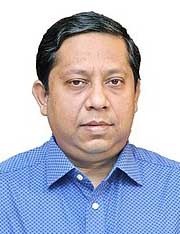The unfinished task of August

August is the darkest month in the calendar of the Bengali Nation. This is the reason why we not only remember Bangabandhu and the fallen heroes of August 15, 1975 with respect during August, but we also remain busy analyzing the events that led to the August tragedy and its aftermath. August has more black letter dates that have permanently tinted our history. Like August 17 and 21.
It has become a regular phenomenon in post-75 Bangladesh that the defeated forces of 1971 become active whenever the calendar turns to August.
Pakistan could never accept their defeat in 1971. The shameless surrender of more than 90 thousand Pakistani servicemen to the Joint Bangladesh-India Command at the racecourse ground on the winter afternoon of December 16, 1971 has never been experienced by the world since the Second World War.
Not only so, the constitution that the Jatiya Sangsad enacted for Bangladesh within less than a year of the country’s liberation was a big slap to Quaid-e-Azam Muhammad Ali Jinnah’s Pakistan established on the basis of ‘Two Nation Theory’. This is evident from the definitions that Bangabandhu gave to the four pillars of the first constitution of independent Bangladesh.
The assassins succeeded in eliminating
Bangabandhu, but their attempts to erase
Bangabandhu’s ideology have failed
He had defined democracy in a way never defined before by anyone in the text books of Political Science. To him ‘Democracy’ was different from Abraham Lincoln’s, ‘For the people, by the people, of the people’. To him it was ‘democracy of the oppressed’. Similarly to Bangabandhu ‘Socialism’ was different from that of Soviet Union, East Europe and China. His version of socialism was closely linked to our history, culture and tradition. Bangabandhu had also defined ‘Secularism’ in a way that didn’t match secularism adopted by Lenin or Kemal Attaturk. In Bangabandhu’s secular Bangladesh, every citizen had right to practice his or her own religion. Religion was only detached from state affairs and politics, because when religion is allowed to intermingle with stately and political issues the outcome is a failed state like Pakistan.
Multiple forces were active against Bangabandhu and Bangladesh from its very inception. One has to remember that Rajakar, Al Badr and Al Shams were all regular paramilitary forces.
Although the Pakistan Army surrendered on December 16, none of these forces ever surrendered. Rather they went on hiding, which has also come up in the writings of those who held key positions in these notorious paramilitary forces in subsequent times. Although Bangabandhu had banned religion based politics and political parties, they were still conspiring underground.
Comrade Abdul Haque was active under the banner of East Pakistan Communist Party in underground in independent Bangladesh and had even sought arms from Zulfiqar Ali Bhutto. We should also not forget the negative role played by the JSD activists. These combined forces of evil were creating the ground for staging August 15 by setting arson to jute mills and jute ware houses, looting police stations and assassinating Awami League MPs.
Before leaving East Pakistan after failed negotiation with Bangabandhu in March ’71, General Yahya Khan instructed his military officials stationed there that he only wants the soil and not the people of East Pakistan, a policy that was very well executed by the Pakistan Army during the 9 months of 1971 under Pakistan occupation when we lost 3 million innocent countrymen and another 3 lakh Bangladeshi women were violated. August 15 was not only a coup, it was part of a greater conspiracy to convert Bangladesh into ‘mini Pakistan’.
General Zia was not only a beneficiary of August 15 coup, but also directly involved with it, which becomes evident if one goes through the documents of the Bangabandhu assassination trial. We know General Zia by his many identities, but what most of us don’t know is that he was an officer of ISI, the Pakistan Military Intelligence. He embarked on fulfilling the unfinished task of his ‘boss’ General Yahya immediately after assuming office, which Anthony Mascarenhas has elegantly elaborated in his book.
The assassins succeeded in eliminating Bangabandhu, but their attempts to erase Bangabandhu’s ideology have failed. If we want to stop these forces of evil once and for all we have to constitute an Independent Commission to identify the masterminds behind August 15. This remains our unfinished task in August and only by doing this shall we do justice to our generations to come.
Professor Mamun Al Mahtab (Shwapnil) is Head, Interventional Hepatology Division, Bangabandhu Sheikh Mujib Medical University & Member Secretary, Samprittee Bangladesh.



